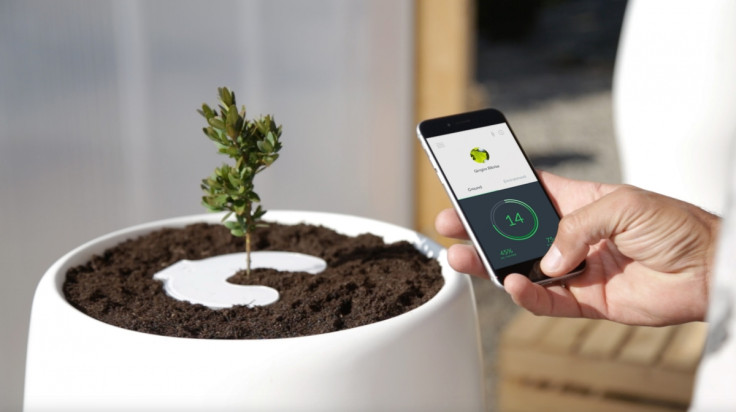Want to be reborn as a tree? There is a smart, biodegradable urn that will help you branch out after death

There's a mean side to life, called death. According to Unicef estimates around 350,000 people are born each day, while 150,000 people die every 24 hours. With such large number of deaths, have you ever imagined what may be happening to the bodies of the deceased? Perhaps some are donated towards science, but a majority are either laid to rest or cremated.
Now imagine, if you could still hold on to loved ones even after they're gone. Well, this is exactly what developers of Bios Urn want to do, albeit in a smart, eco-friendly way.
They have designed an urn to turn human remains into a tree. The incubator-like urn is planted in the soil, which aids a tree's growth process and send its status updates to your smartphone. Described as the "first tree incubator for the afterlife", the app-controlled Bios Incube by Spanish design studio Estudimoline will allow you to stay "connected" to the remains of a loved one or a beloved pet and make sure it grows into a beautiful, thriving tree.
The product by brothers Gerard and Roger Moliné is designed as an accompaniment to the Bios Urn – an eco-friendly vessel made of coconut shell and cellulose that contains a seed that will grow to remember your loved one.
The 100% biodegradable urn's structure allows the seed to germinate separately from the highly acidic ashes. Once the urn starts to decompose, the seed's roots are then strong enough to contact them and the entire structure eventually becomes part of the sub-soil. And customers can pick any seed including oak, maple, pine, gingko, beech, ash, or can opt for an urn without a seed to use their own.
The Bios Urn can be placed into the Incube which includes a built-in irrigation system and a series of sensors to make sure the plant has the right conditions to thrive. The combined technology tracks moisture, soil temperature, levels of light exposure, electrical conductivity and humidity. The incubator's water reservoir automatically waters your tree for up to 20 days to the precise hydration levels needed for the tree, based on its species and environment.
The device can deliver notifications to a mobile app when the water needs to be refilled and notify you about the adequate sunlight and ambient humidity needed as well. Once the tree has sprouted, it can be removed from the Incube and planted elsewhere, allowing the incubator to be reused to plant a new tree.
The Barcelona-based brothers behind the startup say they believe the urn will change the way people think about death which is "often sterilized and avoided in conversation".
"We think its important to change this conversation and open up a new dialogue about death, and the natural processes of life," Roger Moliné told IBTimes UK. "Death is something we don´t know, and many of us tend to fear it in one respect or another. By adding a natural, and contemplative, process (like gardening) to it, you are changing it into something you do know and do understand - life. Everything in the world goes through a cycle, and it´s beautiful to see that as humans, we have the ability to decide our cycle in many ways."
The original idea for the concept first occurred to Gerard as a young child while he was gardening with his grandmother. After finding a dead bird in their garden, she instinctively picked it up, planted it and sprinkled some seeds on top, "giving life to something that was dead".
Gerard later created the Bios Urn as his design thesis in college in 1997, before launching the startup with his brother in 2013. Roger claimed their original idea was to improve the sustainable and eco-friendly aspects of traditional burials and essentially turn cemeteries into forests.
"Cemeteries are places for the storage of death, and they have become economically and environmentally restrictive in the past few years," Roger said. "By planting a Bios Urn and adding a tree, you are replacing a burial plot with more life and nature. Our hopes in the coming years are too open Bios Incube Centers, in which we incubate trees for people. Instead of a place which stores death, it will be a place that quite literally grows life."
According to Moline, the Incube's technology takes the "guesswork" out of the process and allows people to be less worried about whether their tree will grow when they plant it, "especially during times of grief". The Incube Centre is still in development and design process as of now, according to Moline.
The Bios Incube is currently crowdfunding support through their Kickstarter campaign. Since its launch on March 7, the startup has already shot past its funding goal of €60,000 (£48,200), having raised €73,084 so far with 25 hours to go at the time of writing. Deliveries of the incubators are expected to start in November 2016. The Bios Urn costs €120 while the Bios Incube costs €450.
In China, officials are calling for eco-friendly burials as an alternative to traditional burials as the country's graveyards continue to fill up. Prices for burial plots also continue to soar, particularly in countries that do not practice grave recycling. In Hong Kong, there is a four-year wait for an urn space while a private grave can be purchased for $30,000, if one is able to find one. People who cannot afford the burial costs of around £4,500 in some London boroughs,are buried in multiple layers under the ground.
© Copyright IBTimes 2025. All rights reserved.





















